Aprende Inglés, Expresiones Idiomáticas Anglosajonas, Inglés
Expresiones Cotidianas en Inglés – Parte 3
Las expresiones cotidianas en inglés, conocidas como «everyday expressions», suman una gran cantidad de frases básicas coloquiales, que se usan en el día a día. Hoy te compartimos 5 de ellas:
1 ALL OVER THE WORLD = TODO EL TIEMPO
alrededor del mundo, en todo el mundo, en todas partes
Ants live all over the world.
Las hormigas viven en todo el mundo.
English is spoken all over the world.
El inglés se habla en todo el mundo.
Mozart is famous all over the world.
Mozart es famoso alrededor del mundo.
A: I wish I could travel all over the world.
B: That would be a lot of fun!
A: Me encantaría recorrer el mundo.
B: ¡Eso sería muy entretenido!
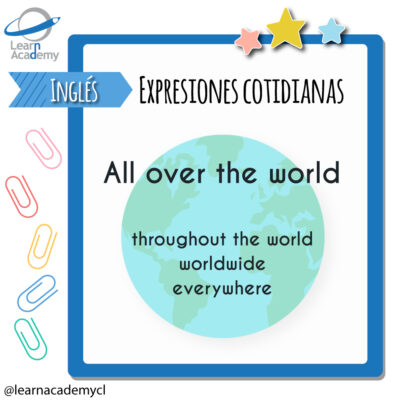
2 ALL THE TIME = TODO EL TIEMPO
constantemente, siempre
Mary practices the violin all the time.
Mary practica violín todo el tiempo.
He is tired all the time.
Él siempre está cansado.
Mark chews gum all the tiempo.
Mark masca chicle todo el tiempo.
A: He looks very happy today.
B: He looks happy all the time.
A: Él se ve muy feliz hoy.
B: Se ve feliz siempre.
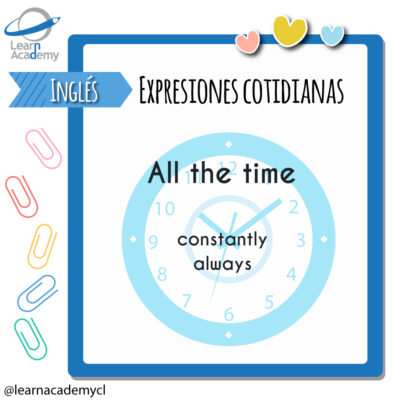
3 ALL THE WAY = TODO EL CAMINO
la distancia completa, el camino completo
The car broke down and we had to walk all the way home.
El auto se echó a perder y tuvimos que caminar todo el camino a casa.
The road goes all the way across the field.
La ruta cruza todo el campo.
Sue was late. She ran all the way to school.
Sue se atrasó. Corrió todo el camino hasta la escuela.
A: Can you run all the way around the soccer field?
B: No, I can’t. I can only run halfway around it, then I’m too tired to keep running.
A: ¿Puedes correr dando una vuelta completa al campo de fútbol?
B: No, no puedo. Puedo correr la mitad, pero entonces quedo demasiado cansado para seguir corriendo.
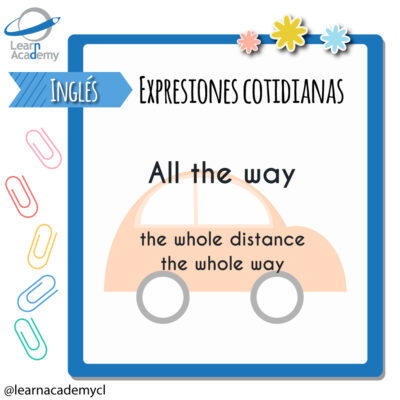
4 AND SO ON = Y ASÍ SUCESIVAMENTE
y así en adelante, y cosas por el estilo, y todo eso, etcétera, entre otros
Potatoes, onions, carrots and so on are vegetables.
Las papas, cebollas, zanahorias, entre otros, son vegetales.
The are many countries in Africa: Zambia, Kenya, Togo, and so on.
Hay muchos países en África: Zambia, Kenya, Togo, etc.
They were always arguing. «I’m the fastest, » «No, I’m the fastest!» «No way!» and so on.
Están siempre discutiendo. «Yo soy el más rápido», «No, ¡yo soy el más rápido!», «¡Por supuesto que no!» y así sucesivamente.
A: What do you feed your pet snake?
B: Small animals like mice, frogs, lizards, and so on.
A: ¿Con qué alimentas a tu serpiente de mascota?
B: Con animales pequeños como ratones, ranas, lagartijas y cosas por el estilo.
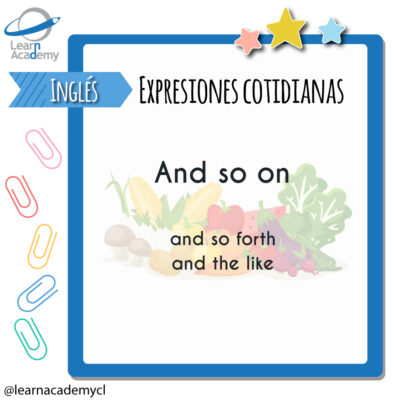
5 ARRIVE AT/IN = LLEGAR A
llegar a, venir a, alcanzar
The train arrived at the station.
El tren alcanzó a la estación.
They arrived at the restaurant.
Llegaron al restorán.
Make sure you arrive at the house before 6:00.
Asegúrate de venir a casa antes de las 6:00.
A: When will we get to the airport?
B: We should arrive at the airport in five minutes.
A: ¿Cuándo llegaremos al aeropuerto?
B: Deberíamos llegar al aeropuerto en cinco minutos.
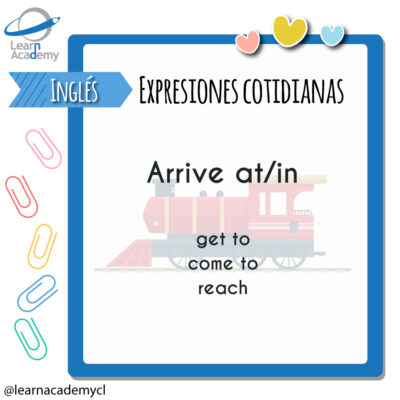
Si deseas saber más Expresiones Cotidianas en Inglés – Parte 3 u otros contenidos, te invitamos a que revises nuestro Instagram oficial https://www.instagram.com/learnacademycl/
También puedes revisar más contenido visitando nuestros artículos relacionados Expresiones Cotidianas en Inglés – Parte 1 y Expresiones Cotidianas en Inglés – Parte 2 y nuestra categoría Aprende Inglés.
Cuéntanos qué otras expresiones te gustaría conocer en un siguiente post y déjanos tus consultas en los comentarios.

